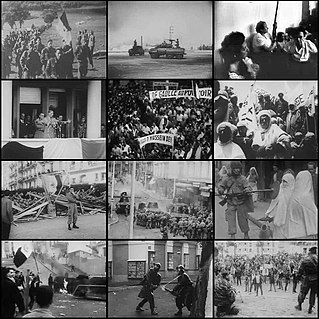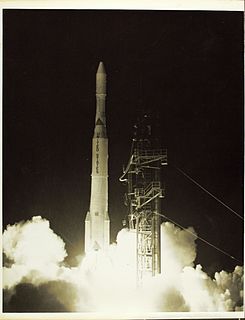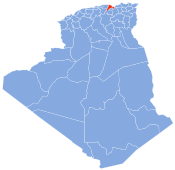Related Research Articles

Algeria, officially the People's Democratic Republic of Algeria, is a country in the Maghreb region of North Africa. The capital and most populous city is Algiers, located in the far north of the country on the Mediterranean coast. With an area of 2,381,741 square kilometres (919,595 sq mi), Algeria is the tenth-largest country in the world, and the largest by area in the African Union and the Arab world. With an estimated population of over 44 million, it is the eighth-most populous country in Africa.

The Organisation Armée Secrète or OAS was a short-lived right-wing French dissident paramilitary organisation during the Algerian War (1954–1962). The OAS carried out terrorist attacks, including bombings and assassinations, in an attempt to prevent Algeria's independence from French colonial rule. Its motto was L’Algérie est française et le restera.

The Algerian War, also known as the Algerian War of Independence or the Algerian Revolution, and in Algeria itself sometimes called The War of 1 November, was fought between France and the Algerian National Liberation Front from 1954 to 1962, which led to Algeria winning its independence from France. An important decolonization war, it was a complex conflict characterized by guerrilla warfare, maquis fighting, and the use of torture. The conflict also became a civil war between the different communities and within the communities. The war took place mainly on the territory of Algeria, with repercussions in metropolitan France.

French Algeria, also known as Colonial Algeria, was the colonial rule of France over Algeria. French rule in the region began in 1830 with the invasion of Algiers and lasted until the Algerian War of Independence concluded in 1962. While the administration of Algeria changed significantly over the 132 years of French rule, the Mediterranean coastal region of Algeria, housing the vast majority of its population, was administered as an integral part of France from 1848 until independence.
Articles related to Algeria include:

Mohammed Dib was an Algerian author. He wrote over 30 novels, as well as numerous short stories, poems, and children's literature in the French language. He is probably Algeria's most prolific and well-known writer. His work covers the breadth of 20th century Algerian history, focusing on Algeria's fight for independence.

Mouloud Feraoun was an Algerian writer and martyr of the Algerian revolution born in Tizi Hibel, Kabylie. Some of his books, written in French, have been translated into several languages including English and German. He was assassinated by the French OAS on 15 March 1962.
Si Mohand ou-Mhand n At Hmadouch, also known as Si Mhand, was a widely known Berber poet from Kabylie in Algeria. Called the "Kabyle Verlaine" by French scholars, his works were translated by fellow Algerians Mouloud Feraoun, Mouloud Mammeri and Boulifa and one of the translations was Les poémes de Si-Mohand (1960). Due to difference of information and sources, some details of his life are not clearly known.
Ammiel Alcalay is an American poet, scholar, critic, translator, and prose stylist. Born and raised in Boston, he is a first-generation American, son of Sephardic Jews from Serbia. His work often examines how poetry and politics affect the way we see ourselves and the way Americans think about the Middle East, with attention to methods of cultural recovery in the United States, the Middle East and Europe.

The Kabyle people are a Berber people indigenous to Kabylia in the north of Algeria, spread across the Atlas Mountains, one hundred miles east of Algiers. They represent the largest Berber-speaking population of Algeria and the second largest in North Africa.

Feraoun is a town in the province of Béjaïa in northern Algeria. It serves as the administrative center of the commune of Feraoun.

Algerian literature has been influenced by many cultures, including the ancient Romans, Arabs, French, Spanish, and Berbers. The dominant languages in Algerian literature are French and Arabic.

The following events occurred in March 1962:

Houda-Imane Faraoun, also spelled Feraoun, is an Algerian physicist and materials scientist who has served as the Minister of Post, Information Technology & Communication in the government of Algerian Prime Minister Abdelmalek Sellal since 1 May 2015. She is also a professor of Physics at the University of Tlemcen, a post she has held in various capacities since 2006. She holds a PhD in Physics from the University of Sidi Bel Abbès and a PhD in Mechanical Engineering from the University of Technology of Belfort-Montbéliard.
References
- ↑ "Feraoun : Revêtement à Iguer Ali" (in French). Djazairess. Retrieved 13 June 2012.
| This article about a location in Béjaïa Province is a stub. You can help Wikipedia by expanding it. |
